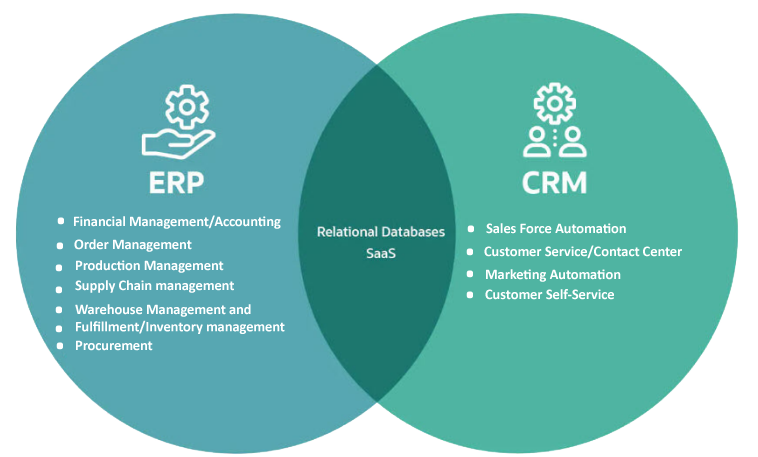CRM vs ERP: Which your business needs more?
CRM and ERP are two important software systems that are essential for businesses of all sizes. While CRM (Customer Relationship Management) and ERP (Enterprise Resource Planning) software solutions may have some similarities, they are distinct systems with different functions and purposes. Understanding the differences between these two systems is essential to determine which one is suitable for a particular business. In this article, we will explore the key differences between CRM and ERP systems and their unique features to help you make an informed decision for your business.
What is a CRM?
CRM stands for Customer Relationship Management. It is a software system that helps businesses manage their interactions with customers, leads, and prospects. CRM software typically includes features such as contact management, sales management, lead management, marketing automation, customer service and support, and analytics. The primary goal of a CRM system is to help businesses build and maintain strong relationships with their customers by providing a centralized platform to track and analyze customer data and interactions.

What is an ERP?
ERP stands for Enterprise Resource Planning. It is a business management software system that integrates various aspects of a company's operations such as finance, accounting, inventory management, human resources, supply chain management, and customer relationship management (CRM). The main goal of an ERP system is to streamline and automate business processes, increase efficiency, reduce costs, and provide real-time visibility into the organization's overall performance. ERP systems typically have a centralized database that can be accessed by different departments or functions within the organization.
Key benefits of CRM
Improved customer relationships:
By centralizing customer data and interactions, CRM enables businesses to better understand their customers, tailor their marketing and sales efforts, and provide more personalized service.
Increased sales productivity:
CRM streamlines the sales process, making it easier to manage leads, track opportunities, and close deals. Sales teams can spend more time selling and less time on administrative tasks.
Enhanced marketing effectiveness:
With a complete view of customer data, businesses can segment their audience, create targeted marketing campaigns, and measure their impact.
Better customer service:
CRM enables businesses to respond to customer inquiries and issues more quickly and effectively. By providing customer service teams with access to customer data and interaction history, they can provide personalized and timely service.
Improved collaboration:
With CRM, teams across departments can work together more effectively. Sales, marketing, customer service, and other teams can share customer data and collaborate on customer initiatives.
Increased efficiency:
By automating processes and eliminating manual data entry, CRM can help businesses save time and reduce errors. This leads to increased efficiency and cost savings.
Key benefits of ERP
Better Data Management:
With ERP, all business data is centralized and accessible in real-time, making it easier for employees to access and analyze the information they need to make informed decisions.
Improved Efficiency:
ERP systems can automate and streamline various business processes, which can lead to increased productivity and efficiency.
Enhanced Collaboration:
ERP systems enable different departments to share information and communicate more effectively, promoting collaboration and improving overall business operations.
Scalability:
As a business grows, an ERP system can easily scale up to meet new demands, allowing for more efficient management of resources and processes.
Cost Savings:
By integrating all business functions into a single system, ERP can help reduce the need for multiple software applications, resulting in cost savings for the organization.

What is the Difference Between CRM and ERP?
Although both ERP and CRM systems are essential for businesses, the key difference between the two is that ERP is mainly used for managing financial data and is handled by the finance department, while CRM deals with customer data utilized by the sales and customer service departments, also known as the front office.
Do I need CRM or ERP or both?
Most companies, regardless of their size, will eventually require both an ERP and a CRM system, or a unified platform that combines both. As businesses grow, they often realize that their current accounting tools, such as spreadsheets or entry-level accounting software like QuickBooks, are no longer sufficient and may hinder their growth or efficiency. Similarly, companies that manage their customer relationships through individual sales reps' email clients or contact management systems may find that they need a more comprehensive CRM system. Whether a company chooses to invest in CRM or ERP first depends on their business model, with those having a small set of high-value customers and complex financials more likely to prioritize ERP, while those with a large customer base requiring frequent contact might prioritize CRM.
NetSuite: Unifying ERP & CRM
As it has already been stated that CRM deals with customer data while ERP deals with financial data. However, some ERP systems have CRM modules integrated, while CRM systems do not include ERP functionalities.
One such example is NetSuite. It is a cloud-based suite of business management tools that includes both enterprise resource planning (ERP) and customer relationship management (CRM) along with a range of business applications including financial management, order management, inventory management, human capital management, e-commerce, and more.
Unlike Salesforce which is a well-known CRM solution but cannot handle transactional data unless integrated with ERP, NetSuite natively integrates CRM and ERP, enabling businesses to streamline their front end as well as back end to increase productivity, and make better, data-driven decisions. Last but not least, NetSuite can be used by businesses of all sizes and across various industries.
How can we help you?
AGSuite Tech is a leading NetSuite Consulting company. Whether you need NetSuite ERP and CRM implementation, we can help you. Feel free to contact us.
